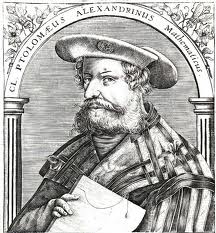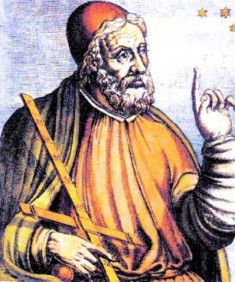Claudius Ptolemy could very well be considered one of the greatest astronomers of the Roman Empire. He lived mainly in Alexandria, Egypt, as it was a province of the Empire at the time of his life. As an author of some of the most important scientific treatises of antiquity, he can be considered a person whom a great deal of modern astronomy has been built upon.
Uncertainties Regarding Early Years
Unfortunately, not very much is known about Claudius Ptolemy. We do know he was born around 90 A.D. and then died around 168 A.D. His life was seemingly lived mostly in Alexandria, Egypt. His exact birthplace is thought to be Ptolemais Hermiou, but calling it exact is somewhat of a misnomer. The notion that Ptolemy was actually born in Ptolemais Hermiou is based a great deal in speculation. Theodore Meliteniotes, an astronomer from the 1500’s, is believed to have started this theory.
Many records about historical figures were never maintained because, truth be told, they did not become notable until later in life. As such, records of their early years were never recorded. Also, the fall of Rome saw many written records and documents destroyed, which is equally unfortunate. So, with Claudius Ptolemy, we are left mainly with his body of work and very little as to his biography.
Since his name was Claudius, though, this might indicate he lived a life of privilege in Egypt as Claudius was the name of a legendary Roman Emperor. His family might not have been able to bestow him such a name if he was of humble origins. He may have been a member of the royal lineage of Egypt. He was not an Egyptian though. Records seem to infer he was a Greek.
Ptolemy’s Contribution to Astronomy
Ptolemy ‘s work was in many different disciplines including mathematics, geometry, astronomy, and geography. He was even involved in the more mystical discipline of astrology.
In the world of astronomy, Ptolemy achieved his greatest acclaim as evidenced via his publication of the treatise Almagest. The Almagest is the only surviving treatise on astronomy from the era of antiquity. The subject of the treaty centers on the motions of the planets and the stars and the paths they travel. The presence of the geocentric model in the treatise would be used for well over 1200 years, showing the amazing accuracy of the work Ptolemy was engaged in.
Ptolemy crafted another treatise entitled The Planetary Hypotheses and it went far beyond what was published in the Almagest. In this work, the theory was presented that there were a number of nested spheres in space. Yes, he was accurately describing the solar system in a more direct manner.
Other Areas of Ptolemy’s Work
 In the realm of geography, Ptolemy published a truly amazing work entitled Geographia. In this work, great details were published about what was currently known geographically about the Roman Empire at the time. A significant portion of the work chronicled the methods Ptolemy employed to arrive at his discoveries.
In the realm of geography, Ptolemy published a truly amazing work entitled Geographia. In this work, great details were published about what was currently known geographically about the Roman Empire at the time. A significant portion of the work chronicled the methods Ptolemy employed to arrive at his discoveries.
The Tetrabiblos went on to become his great work of astrology. In the days of antiquity, astrology was taken more seriously and relied upon by more people than it is today. His work really was not a manual of astrology as much as it was a chronicle of astrological lore and insights into astrology. The work is still considered one of his major treatises.
Interestingly, Claudius Ptolemy would also publish a major work on the subject of music theory. This treatise was known as the Harmonics and it very uniquely examined the relationship between music and mathematics.
His work – Optics – was an examination of light and how it only exists in fragments. Much of what was written in this treatise has been lost to history.
Ptolemy’s Later Years
Not much is known about the final years of Claudius Ptolemy. His death was just as mysterious as his birth and origins. It is strongly believed that when he passed away, he died in the city he spent the bulk of his life, Alexandria, Egypt. But he left behind a legacy of work that continues to influence well into the modern era.
